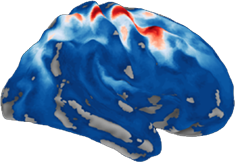PhD defence: Neural and behavioral mechanisms underlying differences in motor control and skill learning
in children, adolescents and adults
Mikkel Malling Beck
PhD thesis
Moving our hands and fingers enable us to engage effectively with our surroundings. We become more proficient in skillfully controlling our movements as we progress from childhood to adulthood. This likely relates to maturation and refinement of the central nervous system through experience and learning, but we know very little about these processes.
This PhD thesis aimed to investigate the neural and behavioral mechanisms underlying differences in motor control and skill learning in children, adolescents, and adults. To this end, we non-invasively recorded electrical activity generated by the brain and muscles as children, adolescents and adults (age range 8-30y) performed and learned new finger movements.
We investigated age-related differences in the communication between parts of the nervous system involved in motor control, and how this changed as individuals learned a motor task. The results of our studies provide novel insights into the development of human motor control and human skill learning.
2021, 184 pages.
Date
4 November 2021, 14:00
Place
Festauditoriet, Bülowsvej 17, 1870 Frederiksberg and online.
Opponents
Associate Professor Mogens Theisen Pedersen (chair), Department of Nutrition, Exercise and Sports, University of Copenhagen, Denmark.
Professor Stephan P Swinnen, KU Leuven, Belgium.
Professor Natalie Mrachacz-Kersting, University of Freiburg, Germany.
Supervisor
Associate professor Jesper Lundbye-Jensen, Department of Nutrition, Exercise and Sports, University of Copenhagen, Denmark.

